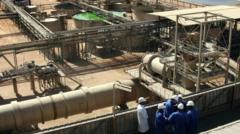In a bid for greater local control over its mineral resources, Niger's military junta has declared the intention to nationalise the Somaïr uranium company, aggravating its ongoing dispute with France and redefining the nation's relationship with its former colonial power.
Niger Junta Moves to Nationalise French-Owned Uranium Company

Niger Junta Moves to Nationalise French-Owned Uranium Company
Niger's military government escalates tensions with France by announcing the nationalisation of the Somaïr uranium firm, previously controlled by Orano.
Niger's military government has made a bold move by announcing plans to nationalise Somaïr, a uranium mine operated by the French nuclear fuels corporation Orano. This decision marks a significant escalation in the rising tensions between Niger and France, amid allegations of "irresponsible acts" by the French company. The military junta, which seized power in 2023, is asserting its desire for greater independence and local management of the country's rich mineral resources as it pivots closer towards Russia, seeking to distance itself from France.
The nationalisation was announced alongside a government statement emphasizing that it would ensure better management and equitable sharing of the wealth generated from mining among Niger's population. Niger, home to Africa's highest-grade uranium ores and the seventh largest producer globally, has been a critical supplier to France, particularly in its energy sector.
Orano, which has maintained operations in Niger for decades and holds a 63% stake in Somaïr, has yet to respond publicly to the nationalisation announcement. However, reports indicate that the French state-owned company has initiated legal proceedings against the Nigerien authorities in response to the seizure of operational control over the firm last year.
This historical tension stems from Niger's independence from France in 1960. Over the years, France managed to secure exclusive rights to Niger's uranium supplies through various agreements, leading to criticisms within Niger that it still bears the yoke of French colonial influence. Nevertheless, experts suggest that any disruption in the mining sector could pose a threat to numerous jobs and significantly impact Niger's export earnings.
The unfolding situation at Somaïr highlights the complexities of Niger’s post-colonial identity and the intricate balance of foreign influences within its rich resource sectors. As Niger navigates this precarious moment, it must weigh the implications of its actions on both its domestic economy and its international relationships.
The nationalisation was announced alongside a government statement emphasizing that it would ensure better management and equitable sharing of the wealth generated from mining among Niger's population. Niger, home to Africa's highest-grade uranium ores and the seventh largest producer globally, has been a critical supplier to France, particularly in its energy sector.
Orano, which has maintained operations in Niger for decades and holds a 63% stake in Somaïr, has yet to respond publicly to the nationalisation announcement. However, reports indicate that the French state-owned company has initiated legal proceedings against the Nigerien authorities in response to the seizure of operational control over the firm last year.
This historical tension stems from Niger's independence from France in 1960. Over the years, France managed to secure exclusive rights to Niger's uranium supplies through various agreements, leading to criticisms within Niger that it still bears the yoke of French colonial influence. Nevertheless, experts suggest that any disruption in the mining sector could pose a threat to numerous jobs and significantly impact Niger's export earnings.
The unfolding situation at Somaïr highlights the complexities of Niger’s post-colonial identity and the intricate balance of foreign influences within its rich resource sectors. As Niger navigates this precarious moment, it must weigh the implications of its actions on both its domestic economy and its international relationships.




















